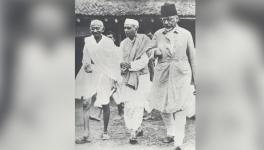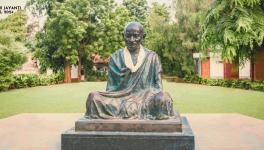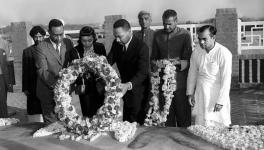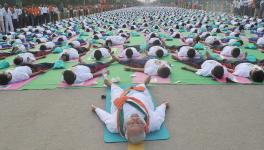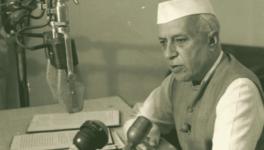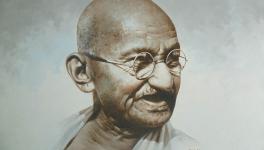Exit Azad! Enter Savarkar!!
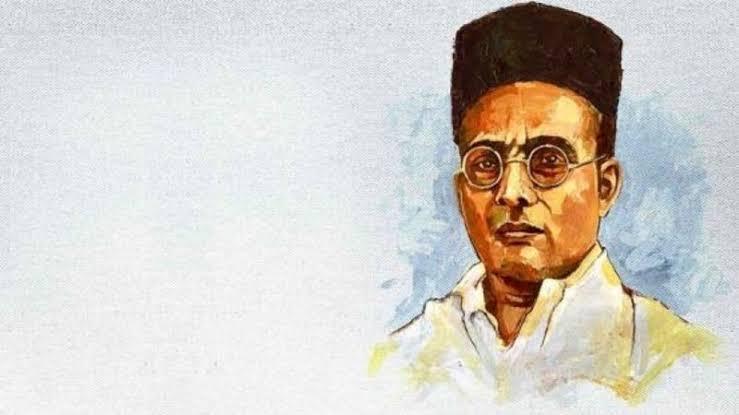
Last year, a statue of freedom fighter and first education minister of independent India, Maulana Abul Kalam Azad, was destroyed by Hindutva mobs at Kankinara in North 24 Parganas district, West Bengal. At the time, there were communal flare-ups in many districts of the state in the aftermath of aggressive Ram Navami marches, the first of their kind in the country.
The episode was immediately forgotten. Few would have had the premonition that the incident was was merely a precursor to the larger game-plan of the Hindutva right, to erase not just the legendary freedom fighter’s statute, but his name from history.
Now, for some reason, the Indian Council for Historical Research (ICHR) has decided to organise a seminar on ‘Veer Damodar Savarkar: Life and Mission’ on 11 November, the birth anniversary of Maulana Azad, perhaps gives an indication of their intent. This particular date also has no apparent connection with Savarkar, who was born on 28 May 1883 and died on 26 February 1966.
Besides, just over a decade ago, 11 November was declared as National Education Day, to commemorate Azad and recall his contribution to policies and institutions that streamlined the educational needs of newly-independent India. It was a day to reflect on and discuss the country’s education system and its future.
To abruptly announce 11 November as a day to rekindle memories of Savarkar—while ignoring Azad—is a throwback to all earlier attempts by the ruling party and government to reinvent the past. One implement in its toolkit is to reset public memories and associations of particular days with national icons.
A write up in the Telegraph newspaper explains how the government led by Prime Minister Narendra Modi has developed a “consistent record of renaming or repositioning calendar days”. Perhaps the reason is that unless the Bharatiya Janata Party is in power its gallery of Hindutva icons fade from public memory, scarcely to be remembered, if at all, by ordinary citizens.
And, in the guise of propping up its own important figures, the BJP constantly strives to replace the heroes and icons of other social groups. For instance, soon after assuming power the government declared that 25 December, which is globally celebrated as Christmas day, would henceforth be celebrated in India as Good Governance Day. This was the BJP government’s attempt to promote a scheme it had launched, which promised good governance. Despite trying to take over 25 December, the scheme was hardly ever heard of thereafter.
Similarly, 31 October is henceforth to be marked as National Unity Day to celebrate Congress leader Sardar Patel’s birth anniversary. The BJP has been promoting Patel as a icon of Hindu-ness, in the mould of how they see Hindus. Forgotten are the days when Patel banned the Rashtriya Swayamsevak Sangh, the mother ship of the BJP. Instead, the BJP is promoting half-truths about Patel’s position on Kashmir, to make him sound closer to their own position. The BJP would also try to argue that its declaration of National Unity Day on 31 October has nothing to do with trying to eclipse Rashtriya Sankalp Divas, which is observed on the same day, to mark the death anniversary of former prime minister Indira Gandhi.
Who can forget 2 October, which is still celebrated as Gandhi Jayanti, the day Gandhi was born in 1869. Now, the day has changed from a celebration of non-violence and communal harmony to focus only on sanitation. For, the BJP government under Modi has turned the international figure into a mascot of swachhta, or cleanliness. Not just cleanliness but many observers of Indian social life have accused the BJP of emphasising on the ‘ritual’ purity aspects of cleanliness rather than on good hygiene and civic facilities. Besides, the appropriation of 2 October is used to promote the government’s flagship project, Swachh Bharat.
Now we are told that plans are also afoot to celebrate the Constitutionalist and first law minister Bhimrao Ambedkar’s birth anniversary, 14 April, as Samrasta Divas. Samrasta reflects the ideological position of the Hindutva Right on the caste system. Instead of preaching equality of citizens based on the Constitution, it preaches harmony within the established caste hierarchy based on traditional Hindu caste divisions.
Along with all these icons, it is celebrating Azad’s birth anniversary that has special relevance today. For, there is an explosion of religiosity across the country and a deadly combination of religion and politics in free play in public life. Azad had played a stellar role in the independence struggle, contributing as a scholar, a journalist and a senior leader in the Congress, whose president he was twice.
Azad was a devout Muslim all his life, but never wavered in his commitment to the idea of Hindu-Muslim unity and secularism. He rejected the two-nation theory and carving out of Pakistan. He was of the firm opinion that it is one of the “greatest frauds on the people” to suggest that religious affinity can unite areas which are geographically, economically, linguistically and culturally different. What he meant is that Independent India would be a country where members of all religions would be equal as citizens.
He opposed Pakistan’s founder Mohammad Ali Jinnah on this front, which led to his isolation within the Muslim community as well. In 1947, some agitated students even flung a garland of shoes at him and called him “traitor to the Islamic cause.”
Imagine his inner strength that Azad did not fall prey to the logic of majoritarianism within the Muslim community and stood by his principles despite Muslims in the Congress party also feeling that they were “discriminated against in the lower rungs of the party and efforts to keep them out of the organisation,” after it won a majority of the seats in the 1936-37 provincial elections. Azad remained firm, convinced that “the higher echelons of the Congress was not communal.”
While inaugurating the Ramgarh session of the Congress party in 1940, Azad criticised religious separatism and called upon Muslims to preserve a united India. “...Islam has now as great a claim on the soil of India as Hinduism. If Hinduism has been the religion of the people here for several thousands of years, Islam also has been their religion for a thousand years. Just as a Hindu can say with pride that he is an Indian and follows Hinduism, so also we can say with equal pride that we are Indians and follow Islam... The Indian Christian is equally entitled to say with pride that he is an Indian and is following a religion of India, namely Christianity,” as the late historian Mushirul Haq said.
But why does the Hindutva Right want to “reinvent” even Maulana Azad, who challenged Jinnah, opposed Partition and remained a consistent critique of the two-nation theory?
The attempt to replace Azad demonstrates that despite their continuous stigmatisation of Jinnah and his brand of politics, there is a strange commonality between the proponents of Hindu rashtra and those who espouse the cause of Nizam-e-Mustafa or Islamic state. They agree over the basic proposition that religion can be a basis of nationhood. Thus, it is no coincidence that while Savarkar was the first to claim that India comprises two nations, exclusively Hindu and Muslim respectively, Jinnah propounded his two-nation theory in 1939, exactly two years later.
Documents tell us that in 1937, Savarkar, in his presidential address delivered at Ahmedabad at the 19th session of the Hindu Mahasabha, openly declared that India comprises of two nations (Collected works of VD Savarkar, Vol VI, published by Maharashtra Prantik Hindusabha, Poona, 1963, p 296.) Of course, someone like Azad, who did not mix religion with politics, would always be anathema for such a worldview.
The slow, albeit decisive, attempt to erase Azad from India’s history hearkens back to an actual episode in British-ruled India, when Hindutva fanatics had hatched a conspiracy to assassinate Maulana Azad. The plot was hatched by Ganesh Savarkar, the older brother of Hindutva ideologue Vinayak Savarkar, who failed to execute his plot. It is now a part of recorded history that Ganesh was popularly known as Babarao, one of the five who founded the RSS in 1925 along with KB Hedgewar, BS Moonje, LV Paranjpe and BB Tholkar. In any case, their plot was discovered by the colonial government’s spies. Their reports are now part of Delhi Police Archives. Even at the breakneck pace at which its proponents are rewriting history in the Hindutva mould, its real past will habitually catch up with it.
Subhash Gatade is an independent journalist.
Get the latest reports & analysis with people's perspective on Protests, movements & deep analytical videos, discussions of the current affairs in your Telegram app. Subscribe to NewsClick's Telegram channel & get Real-Time updates on stories, as they get published on our website.











